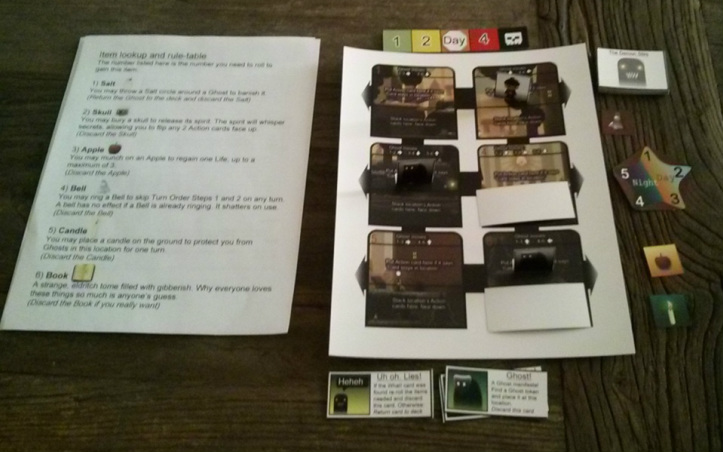|
So, as anyone who knows me is aware, BeMuse has been quite a painful process, so far. Oddly enough, the unrestricted freedom of 3D middleware has caused more churn than I had ever expected. When you are told you can do pretty much anything, your sheet of blank paper expands enormously, and it's easy to get off track. As such, in an effort to refocus more clearly on the game's core, and ensure that the major ruleset, themes and elements don't flipflop like they did at the end of last year, I created a little BeMuse-themed board game. It is a single-player game designed to be played in short bursts, and revolves around finding the ritual elements necessary to banish a single Demon in a four day period. Night is more dangerous than day, as Ghosts wander around the environments draining your life if you end a turn on one of their locations. During the game, the main Demon 'Stirs' (i.e. kind of tosses and turns in his sleep), which causes a whole heap of unpleasant effects in the world. The good news is that it plays pretty well, and definitely helped me get back to the core of what this game is. As a result, we're going to go through a period where BeMuse looks a bit uglier for a while, as I strip everything back and ensure the core game is working well rather than messing about with shaders at the same time as bringing every single feature in at the same time. This brings me to another point. Experiential vs. Rule-based gamesSince my earlier post about 'The Zone of Meh', I came to a realisation that the reason a lot of art-games get away with so little actual content is because they are nearly 'experiential'. By that, I mean that their value comes from the sense of immersion in their artistic world rather than any other aspect... and thus nearly every other aspect is unnecessary. Journey, Proteus, Gone Home, Dear Esther... all largely free of 'content', but filled with atmosphere and a sense of place. Of course, one can argue that nearly all games are experiential as well rule-based. This is true, but not exactly what I'm getting at. For me, I define these terms by answering the question 'where does this game get its appeal?' If the answer is stats-building, or improving skill, or any other mechanical play device, I'd argue it's moving away from Experiential. Fez is a rare outlier here, as - once you've moved past the whole '2D/3D' gameplay novelty, you realise that it was largely devised as an experiential game (and it starts to feel more like Knytt - a game I have loved for years). It is a pleasure just to 'be' in its world. So What?All this pseudo-academic musing is very relevant to BeMuse, and what I release about the game as it moves on. BeMuse is supposed to be a largely experiential game, but with a ritual-game-play heart. That means I have to be a bit more careful about what I put out there because crappy, unfinished visuals can horribly diminish the sense of mystery, threat and cosiness. I'd hate that to happen.
As ever, thanks for your patience, folks.
10 Comments
|
AuthorFluttermind’s director, Dene Carter, is a games industry veteran of over 25 years, and co-founder of Big Blue Box Studios, creators of the Fable franchise for the XBox and XBox 360. Archives
April 2022
Categories |


